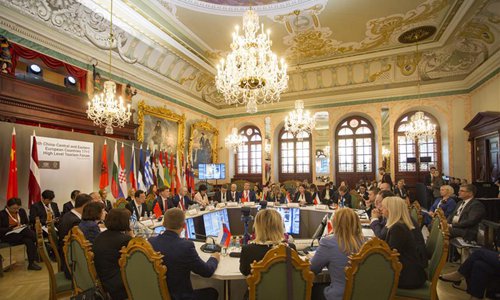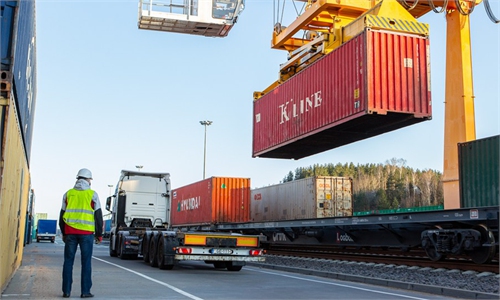
Participants attend the 5th China-Central and Eastern European Countries (CEEC) 17+1 High-level Tourism Forum in Riga, Latvia, on Oct. 23, 2019. (Photo by Edijs Palens/Xinhua)
A series of events involving China and European countries took place lately, bringing their relations right into the spotlight.Foreign ministers from four European countries - Poland, Serbia, Ireland and Hungary - paid a visit to China from Saturday to Monday.
Ahead of their visit, China's top diplomat Yang Jiechi visited Slovenia and Croatia last week. During his visit, Yang called on implementing the results of the China-Central and Eastern European Countries Summit.
On May 22, Lithuanian Foreign Minister Gabrielius Landsbergis announced his country was effectively quitting the 17+1 mechanism calling it "divisive" from an EU perspective. He also urged other members to withdraw.
The EU is an observer of the 17+1 mechanism and attended the previous summits. However, the mechanism has always been on the EU's radar, and voices within the EU constantly hype up the false fact that China is dividing the EU. The accusation, also made by Landsbergis, is groundless. On the contrary, China has always supported Europe's integration process at various occasions, and applauds EU countries to choose their own development path. As for the 17+1 mechanism, the leaders of all participant countries have reached a consensus that the relations between China and Central and Eastern European countries are an important part of the entire China-Europe relations.
Forces that attempt to split the EU do exist. But they do not come from China, but within and outside Europe; including the EU's close ally the US. Within Europe, there are several sub-regional organizations that see the participation of Lithuania. Based on statements by some politicians who accused China of dividing Europe, those cliques also serve a divisive role - so does Lithuania. Why did Lithuanian foreign minister and those politicians not blame members of the organization instead of China? This only shows that they tilt toward Washington's moves to drive a wedge between China and Central and Eastern European countries and between China and Europe.
Within the EU, there have always been pro-EU and EU-skeptic forces. The internal and external forces of the EU make the EU integration process a bumpy one. Since the EU allows the existence of sub-regional organizations and does not oppose cooperation between its member states and non-EU countries, there is no reason to object to cooperation between China and Central and Eastern European countries.
Lithuania and the EU should look for reasons of EU disunity from within, not shift the blame onto China.
Lithuania's high-profile withdrawal from "17+1" is not expected to exert any big influence on cooperation between China and Central and Eastern European countries or China-Europe ties.
The trade volume between China and Lithuania has increased greatly since the establishment of the 17+1 mechanism, but the volume was minor. It could even be called negligent if we take the overall trade activities between China and Central and Eastern European countries into consideration. From the economic sense, Lithuania quitting will only cost itself.
From the political perspective, the recent intensive visits between China and Central and Eastern European countries show that their cooperation has not been negatively affected by Lithuania's withdrawal move. The move is nothing but a political show of the new ruling elites to cater to the newly sworn-in US Biden administration. But still, China has to keep alert of the chain reaction effects - particularly US explicit or implicit involvement. China must take precautions measures in this light.
Indeed, Beijing and Washington have come to an era of full-fledged competition. The importance of another "polar" - the EU - is becoming prominent. China should prevent the EU from completely leaning toward the US. Central and Eastern European countries are friendly forces toward China within the EU, and the shift in attitude of Lithuania sounds an alarm bell to China. Lithuania does not represent the EU or Central and Eastern European countries.
China's focus of attention should be on cementing ties with other Central and Eastern European countries, and preventing the US from sowing a discord.
The author is a research fellow at the Charhar Institute and a PhD candidate at the Institute of International Relations, Nanjing University. opinion@globaltimes.com.cn

